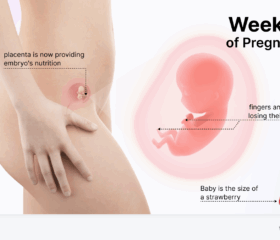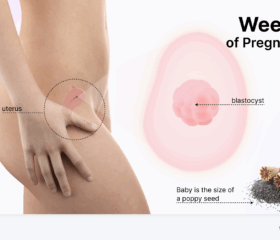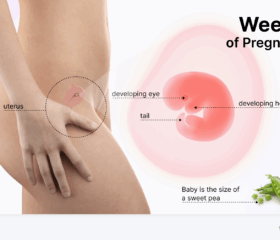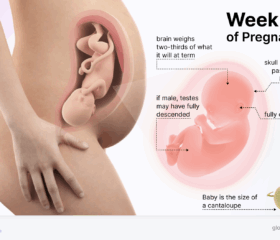Pregnancy Week by Week
14 Weeks Pregnant
Your baby is as big as a navel orange.
3.75
inches
2
ounces
14 Weeks Pregnant: Symptoms, Baby Developments, and Key Tips
Your baby is hitting big milestones this week. He’s making his first facial expressions, and you might even feel his first few kicks.
Read on to find out more about what’s happening with your baby, what symptoms you can expect, and how to look after yourself at 14 weeks pregnant.
Your baby at 14 weeks
At 14 weeks, your baby is now about the size of a navel orange, measuring between 3½ and 4 inches in length and weighing around 2 oz. 1 By convention, your baby is now measured from head to toe rather than from head to bottom (as it was previously).
Other big developments include your baby’s:
- Face: Your baby’s getting ready to laugh at your jokes, as well as get sassy with you. His facial muscles are now active, allowing him to grimace, frown, and even practice tiny smiles.
- Movements: His movements are now smoother and more coordinated, a marked change from the jerky motions of earlier weeks.
- Hair: Your baby’s hair follicles are forming, and his scalp, eyebrows, and body are developing soft, downy hair called lanugo. This thin layer of hair plays a role in keeping your baby warm as it grows inside your womb. 2
- Skin: Your baby’s skin is beginning to thicken, and his fingerprints are forming.
What can you see in an ultrasound at 14 weeks?
There’s a good chance you’re between ultrasounds this week. Most routine pregnancy ultrasounds occur earlier in the first trimester, and later, between weeks 18 and 22 (for the anatomy scan).
That said, if you do have an ultrasound at this stage, you might catch a glimpse of your baby’s tiny movements and those features we just mentioned, such as his newly developed face.
Can you tell if your baby is a boy or a girl at 14 weeks?
Determining your baby’s sex can still be tricky at this point. While his genitals are developed, they may still be too small or positioned in a way that makes them hard to identify.
Be patient! You’ll probably only have to wait a few more weeks to see the signs of having a boy or a girl.
When can you feel your baby’s movements?
Your baby’s movements will typically become noticeable when you’re between 16 weeks and 22 weeks pregnant. If this isn’t your first pregnancy, you might notice a few subtle flutters in week 14, but that isn’t guaranteed.
While you’re undoubtedly eager to feel your baby kick, remember that every pregnancy progresses at its own pace. Just be patient as your baby grows more active.

Your body at 14 weeks pregnant
By now, your uterus has grown beyond your pelvis and is rising into your lower abdomen. You may even be able to feel the top of your uterus, called the fundus, just above your pelvic bone.
This is often when you’ll start “popping”—in other words, when you start having a visible baby bump.
You’ll typically start gaining more weight at this stage of your pregnancy. If you had a normal body mass index (BMI) when you got pregnant, expect to gain about a pound per week during the second trimester. If you started with a higher or lower BMI, your doctor may offer more tailored guidelines.
What symptoms can you expect at 14 weeks?
Many of the worst symptoms from the early stages of your pregnancy, such as morning sickness and fatigue, have probably decreased. They’ll more than likely stay gone, which you’ll no doubt be relieved to hear.
However, you may still have other noticeable pregnancy symptoms, such as:
- Round ligament pain: As your uterus expands, the ligaments supporting it will stretch, causing sharp or dull pains in your lower abdomen.
- Bleeding gums: Pregnancy hormones can increase blood flow to your gums, which may cause “pregnancy gingivitis.” This condition makes your gums extra sensitive, causing them to bleed when you brush or floss.
- Skin changes: You may notice that you have darker areolas or visible veins (potentially even varicose veins) due to your increased blood volume.
- Hair changes: Your hair may also appear thicker and shinier as hormonal changes slow hair loss.
- Increased appetite: You’ll feel extra hungry in this stage of your pregnancy, and for good reason—you’ll need an additional 340 calories per day to meet your growing baby’s needs. 3
You could try using a pregnancy tracker app to keep tabs on any new symptoms that show up. The best pregnancy trackers also provide tips and educational content to help you manage these symptoms.
Is it normal to have leftover symptoms from the first trimester?
While many women find that they no longer have the nausea that’s characteristic of the first trimester, you may still have it at 14 weeks. If this is the case, combat it with all the usual methods:
- Eating small, frequent meals (rather than a few large meals)
- Staying hydrated
- Getting plenty of rest
If you have unusual symptoms, like severe swelling or pregnancy-induced headaches, speak with your doctor to ensure everything is progressing smoothly.
Do you need to gain more weight if you’re having twins?
At this stage, being pregnant with twins probably doesn’t mean you need to gain any more weight than a singleton mom-to-be.
However, once you reach week 20, you will need to start putting on more pounds than moms carrying just one baby. Women expecting twins need extra calories (generally beyond what’s usually required during pregnancy, although the exact amount you’ll need to eat varies—what’s most important is to gain weight at the rate your doctor tells you is healthy).
How to look after yourself and your baby at 14 weeks
As you enter your second trimester, you’ll need to take a few steps to look after your body, manage your symptoms, and make sure your baby gets everything he needs to keep growing healthily.
Taking care of your body
Looking after your health is important for both you and your baby. Focus on the following:
- Balanced nutrition: Make sure you eat a lot of nutrient-dense foods to support your baby’s growth. Incorporate protein, calcium, and fiber into your pregnancy diet. Protein aids your baby’s tissue development, calcium strengthens his bones, and fiber helps prevent you from getting constipated.
- Tracking your weight: Relatedly, you should weigh yourself periodically at the same time of day, preferably in the morning, to make sure you’re gaining weight in line with your doctor’s recommendations.
- Hydration: Pregnancy hormones can cause sinus congestion and a stuffy nose. Use a humidifier and drink plenty of water to ease these symptoms.
- Prenatal exercise: With your energy returning, now’s a great time to engage in light-to-moderate exercise. Yoga, water exercises, and walking top the list of the safest and best pregnancy workouts. Aim for 30 minutes most days. You can also sign up for prenatal exercise classes to get expert guidance and meet other expectant mothers.
- Skincare: Use moisturizer to soothe itchy and dry skin. While creams can’t prevent stretch marks, they can help your skin feel more comfortable.
It’s worth noting that you should also stay up-to-date on your vaccines. You can get the flu shot while pregnant; it’s perfectly safe, and doctors strongly recommend it, as you’re more vulnerable to the flu during this period due to your changing immune system.
Vaccines keep you safe, as well as your baby. They provide antibodies that will help protect him after birth.
Keep an eye on your moles
Pregnancy hormones can change the appearance of any skin moles you have. Usually, this is nothing to worry about, but you should consult a dermatologist if any of your moles become discolored or asymmetrical, develop an irregular border, grow larger than a pencil eraser, or appear to be rising on your skin’s surface.
Risks to avoid
Being pregnant means avoiding certain activities, or at least being cautious about them. You almost certainly already know that you can’t drink any alcohol while you’re pregnant or smoke cigarettes. You should also be careful about:
- Tattoos: Although the risk is small, getting tattooed while you’re pregnant can increase your chances of infection. Any tattoos you get may also change in appearance as your skin itself changes, so if there are new designs you have your eye on, it’s best to wait until after your pregnancy to get them. Plus, this will give you something to look forward to (apart from meeting your baby, of course).
- Nail care: If you enjoy getting your nails done, opt for pregnancy-safe nail polish, and avoid treatments like acrylic nails that emit strong fumes.
If you’re not sure whether something’s safe for pregnant women, it’s never a bad idea to ask your doctor about it. It’s better to be safe than sorry.
Prioritizing your self-care and comfort
Pregnancy isn’t all about self-denial, of course. It’s equally important to be nice to yourself, especially after weeks of challenging first-trimester symptoms.
Now’s a good time to:
- Get maternity clothes: If your bump is showing, maybe you should start wearing maternity clothes. Comfortable and well-fitting clothing will only get more and more necessary as your belly continues to grow.
- Have a prenatal massage: You might want to consider a prenatal massage to alleviate any discomfort you’re feeling. However, it’s important to consult with your doctor beforehand, and only work with a registered masseuse who’s qualified to give prenatal massages.
Final thoughts
Big congratulations are in order: you’ve made it into your second trimester! All your trials and tribulations over the past few months have paid off, and now you’ve reached what many women call the “honeymoon stage” of pregnancy.
If you haven’t already, now’s a great time to start brainstorming baby names. This can be a difficult decision (and a potentially divisive one, if you have a partner or family members with strong feelings about it), but you’ve got plenty of time.
Use your extra energy to think about questions like that, and to take back some of the freedom you had before you got pregnant. If you’re planning on taking a “babymoon” with your partner, now’s also an ideal time to plan it.
This is a time to be celebrating, so smile, especially considering your little one may have just started smiling, too.
Article Sources
- Baby Your Baby. "Fetal Growth Chart" Retrieved June 23, 2025.
- StatPearls. "Embryology, Lanugo" Retrieved June 23, 2025.
- American College of Obstetricians and Gynecologists. "Nutrition During Pregnancy" Retrieved June 23, 2025.







